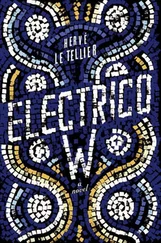This FOXP2 gene plays a decisive role in the production of language in all animals. It acts like the conductor of an orchestra when the neural pathways are being laid down during embryo development. A “knockout” mouse (one that has been genetically modified) in which FOXP2 has been altered does not squeak like a normal mouse but almost like a bat, in the ultrasonic range. I’d like to refer you to the work of the team comprising Shu, Morrisey, Buxbaum et al. This gene also codes the swallowing process, tongue movements, etc.
In Homo erectus , FOXP2 mutated radically some two hundred thousand years ago. In other words, shortly before the advent of the Neanderthals and ourselves, the Cro-Magnons, Homo sapiens . This FOXP2 mutation is found in both types of Homo . It supports presumptions of a common ancestor, but that’s a whole other debate. So language appears less as a tool than as an organ. An organ which requires an indispensable process of apprenticeship. Mastering it goes hand in hand with the development of the cervical lobes: the brain is then arranged around language just as language structures the brain. That’s why we cannot acquire a so-called mother tongue after the age of six … but I’m not here to talk about the ontogenesis of language, other contributors will cover that, and I don’t want to encroach on their territory. In any event, I’m not interested in distinguishing between the acquired and the innate, but in knowing, first, when in the genetic history of a primate population the mutation facilitating speech occurred, and second, at what point in an individual’s development the neural connections that make language possible are established. We are still waiting for breakthroughs in the ontogenesis and phylogenesis of language.
Let’s say that, just as there was a proto-eye before the eye and a proto-hand before the hand, there was also a proto-language before language. A language of a few dozen words, but one, I fear, we know nothing about, because language doesn’t fossilize very well. I have nothing against Plato when he explains in his Cratylus that words appear in relation to natural sounds. Here I’d like to refer you to Jakobson’s famous article: yes, “mama” is almost certainly a universal that is systematically reinvented for the simple reason that ma is the first sound a baby can make. I’m also happy to accept that the word “tiger” comes from the roar of that grr . And I won’t devote my energies to disputing Merritt Ruehlen’s affirmations about mother tongue, the protonostratic language, although, to my mind, archeolinguistics is far too speculative, except for writing poems.
I will confine myself to one certainty: this proto-language must have conferred a decisive competitive advantage. Of course, there is the utilitarian vision: language means you can warn the group of unseen danger, tell them where to find food, and share experience. But I am even more keen on what I shall call the “litterarist” hypothesis: in social primates such as Homo neanderthalensis and Homo sapiens , language means first and foremost being able to tell a story. The new tradition says: “Don’t kill your neighbor because someone once did that and you just listen to what happened to them.” Myth then reinforces the group’s social cohesion and acts as a counterbalance to the effects of intelligence and individual self-interest. Not forgetting that, according to some evolutionists, language constitutes an advantage in the sexual realm: a female would choose a male who masters language over one with a more impressive physique: Rimbaud rather than Rambo. This theory is very popular with academics, particularly those not endowed with much muscle.
Romain the svelte turns toward the pudgy Jacques; his schoolboy joke makes the audience laugh. It works every time.
Romain will not reveal how, ten years earlier, he spent his first evening with Louise stammering and stuttering while his future wife — perfectly at ease and perfectly in control of her emotions — affectionately made fun of him, even then. The young academic did not win her, it was more she who chose him. For his natural decency, for the almost naive purity in the way he looked at her, and for his acute intelligence made all the more dazzling by his terrible gaucheness. But Louise very quickly realized that this peculiar difficulty with words that initially seduced her would end up exasperating her. Turning Romain into an incomparable orator struck her as a worthy challenge. And he soon became one. But his newfound assurance did not draw solely on exercises in diction and the quality of his notes. It owed much more to the pride he felt in being the man whom Louise Blum allowed to walk beside her in the street.
“Now I would like to cut to the quick of the subject …” Romain goes on.
When, an hour and ten minutes later, with that appropriate runover on time, the speaker stops talking and invites his audience to contribute in a discussion, there is one man in the back row of the Linnaean Auditorium who has not taken a single note. When the question-and-answer session begins, the man does not ask any questions either, even though, like all psychoanalysts, he would have liked to hear the word “subconscious” pronounced at some point in this conference on the cognitive sciences.
Thomas Le Gall has not taken his eyes off Romain Vidal for a moment, though. This is the man who wakes every morning beside Louise Blum, the woman he is falling in love with, and whom he has just made love to for the first time. Romain Vidal is not his rival, because no one ever has a rival. Thomas had no urge to confront the image of “the husband.” He wanted to see the man that Louise Blum had loved and still loved, and also, perhaps, wanted to put his own feelings to the test. Thomas feels the beginnings of sympathy for this great tall boy whose secret shyness he can see, whose fluid logical train of thought he admires, and whose friendship he knows with regret he can never have.
• •
I T HAD BEEN SUCH A HOT SUMMER. Anna and Stan spent it near Grignan, in the house they rented every year. The heat wave sent statistics through the roof. Twice as many forest fires, homicides, multiple pileups, and old people dying in hospices. The drought affected sixty regional départements . There was a ban on filling swimming pools, and those that were filled had to act as reservoirs for the fire department. On the radio and in bistros, all the talk was of global warming. When Karl and Lea sat down in the car, they squealed because the seats were so hot. Anna ran a damp sponge over the plastic surfaces to cool them, and the children begged to have the air conditioning on but kept the windows open.
They were bored. They devoted the morning to making a list of things they needed to buy, went into town to buy them, and had a coffee on the town square, then the temperature started to rise and they went back to the house. They ate lunch, cleared the table, and did the dishes before the ants invaded. It was too hot to have a siesta. Karl and Lea squabbled constantly to fill the time.
There were wasps. Stan made a trap by cutting open an Evian bottle and putting very sugary wine into it. They soon came to die in there, dozens of them. Anna could not bear to see her children entertained by their endless paddling, the hours they took to die. Particularly Karl, who called her in a state of great excitement every time a new victim ventured into the fatal opening. She did not recognize her own son in this cruel delight. He was the one who, with morbid fascination, emptied out the insect juice at the bottom of the garden every morning.
There was also the pool. It was unfit for use before five o’clock in the afternoon, when the sun dived behind the old farmhouse. The children watched the line of shadow advance very slowly across the blazing hot paving stones, as if watching the progress of a column of ants.
Читать дальше












